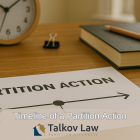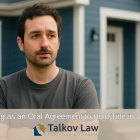Pittsburg Real Estate Partition Lawyer
Talkov Law’s attorneys serving Contra Costa County are exceptionally experienced in California partition actions and have conducted over 470 for our satisfied clients. A California partition action is a law that allows co-owners of real property to divide the property among themselves. The partition statutes provide a legal mechanism for co-owners to divide the property without having to go through the court system. The partition statutes also provide a way for co-owners to resolve disputes over the division of the property. The partition statutes provide that the court may order a partition of the property if the co-owners cannot agree on a division. The court may also order the sale of the property and the division of the proceeds among the co-owners. The partition statutes also provide that the court may award attorney’s fees and costs to the prevailing party in a partition action.
Our team of partition attorneys can assist co-owners with frequently asked questions about partitions, such as:
- Can you lose interest in a jointly owned home by moving out? Generally, co-owners maintain their ownership interests regardless of whether they live at the property. However, in rare cases, leaving the property for many years without paying taxes or other expenses may allow the co-owners in possession to argue that they have adversely possessed the property. Generally, these co-ownership disputes do not get easier with time, so it is important to act promptly.
- Can heirs force the sale of property? Heirs can force the sale of real property in California once that property is distributed to them. However, sometimes, the property is still held in a trust where the trustee will sell the property. When there is no trust, the probate court may decide that the probate administrator will sell the property before it is distributed in fractional interests to the heirs.
- Can a partition action be stopped? Generally, a partition action cannot be stopped, but a defendant may be able to buy time to seek a resolution. Eventually, however, the plaintiff can generally force the sale of the property based on the absolute right to partition.
- What is the timeline for a California partition action? Most partition actions are resolved in 3 to 6 months by way of settlement. Other cases can take 6 to 12 months to obtain an interlocutory judgment of partition, which generally appoints a referee to sell the property.
- Can a partition action be filed for both real property and personal property in California? Yes, all co-owned real and personal property can be partitioned under California law. Cal. Civ. Proc. Code § 872.020.
Pittsburg is a city located in Contra Costa County, California. It is situated in the East Bay region of the San Francisco Bay Area, and is a suburb of Oakland and San Francisco. Pittsburg is known for its diverse population, its waterfront, and its historic downtown. The city is home to a variety of businesses, including a large steel mill, a port, and a variety of restaurants and shops. The city is also home to a number of parks, including the Delta de Anza Regional Trail, which offers scenic views of the San Joaquin River. Pittsburg is also home to a number of annual festivals and events, including the Pittsburg Seafood Festival and the Pittsburg Jazz Festival.
Speak to Our Pittsburg Partition Attorneys Today
Call our Contra Costa County Partition Attorneys today to end your co-ownership dispute. You don’t pay until the house is sold!
Call us at (925) 999-7700 or contact us below to schedule a free, 15-minute consultation
Klein v. Maddox – Partition Action Case Study
In the legal case of Klein v. Maddox, 59 Cal.App.2d 141 (1943), the issue was whether a partition of real property was proper. The plaintiff, Klein, owned a parcel of real property with his brother, Maddox. Klein wanted to partition the property, but Maddox refused. Klein then filed a partition action against Maddox. The trial court found that the partition was proper and ordered the property to be divided. Maddox appealed the decision, arguing that the partition was improper because the property was not susceptible to division. The appellate court affirmed the trial court’s decision, finding that the property was susceptible to division and that the partition was proper. The court also noted that the partition was in the best interests of both parties, as it would allow them to each have their own separate interests in the property.
Frequently Asked Questions About Partitions in Pittsburg
How Much Does a Partition Action Cost in Pittsburg?
The costs of a partition action—including attorney fees, court fees, appraiser fees, and other legal expenses—are typically around $20,000. While some cases may incur fees as low as $5,000 or exceed $20,000, depending on their complexity, these expenses are generally shared among the co-owners. The court may also adjust the distribution of these costs based on each party’s level of involvement or responsibility, ensuring a fairer allocation when needed.
Who Can File a Partition Action in Pittsburg?
A partition action can be filed by any co-owner of a property, excluding married couples who own it as community property. A majority ownership is not required to initiate a partition action. Common situations for partition actions include disputes among siblings inheriting property, former romantic partners, friends or family members who purchased property together, and divorced couples.
Who Pays for a Partition Action?
In Pittsburg, each party typically pays for their own attorney’s fees (known as the “American Rule”). However, California partition law allows for an exception to this rule, stating that “the court shall apportion the costs of partition among the parties in proportion to their interests or make such other apportionment as may be equitable.” California Code of Civil Procedure 874.040. Indeed, the court may award “reasonable attorney’s fees incurred or paid by a party for the common benefit.” California Code of Civil Procedure 874.010(a).
Can a Partition Action Be Stopped in Pittsburg?
Generally, a partition action cannot be stopped, but a defendant may be able to buy time to seek a resolution. Eventually, however, the plaintiff can generally force the sale of the property based on the absolute right to partition.
Contact our Team of Experienced Partition Lawyers Serving the City of Pittsburg, County of Contra Costa, California
Our Pittsburg partition litigation attorneys will work diligently to obtain a favorable outcome on your behalf, whether by negotiation or litigation. Talkov Law Partition Attorneys unlocks access to justice for co-owners by funding your case. For qualified cases, you pay no fees until we successfully partition your property by obtaining a sale on the market or to your co-owner! For a free consultation with California’s first and largest team of partition attorneys at Talkov Law, call (925) 999-7700 or contact us online today.































































































































